Backo
|
| posted on 3/3/21 at 08:59 PM |

|
|
Battery in passenger's foot well?
As per the title - could the battery in the passenger's foot well be considered a failure and why?
I couldn't find any reference in the manual, but neither have I seen many batteries mounted that way, so it makes me wonder...
Cheers
[img]https://photos.app.goo.gl/va6d2jCdXJAwFVxB6[/img]
Pic attempt
|
|
|
|
|
40inches
|
| posted on 3/3/21 at 10:26 PM |

|
|
quote:
Originally posted by Backo
As per the title - could the battery in the passenger's foot well be considered a failure and why?
I couldn't find any reference in the manual, but neither have I seen many batteries mounted that way, so it makes me wonder...
Cheers
[img]https://photos.app.goo.gl/va6d2jCdXJAwFVxB6[/img]
Pic attempt
I fitted mine in the footwell, passed IVA.
The battery may need to be isolated from the passenger compartment?
This is mine:
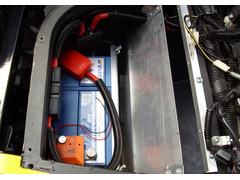 
Description
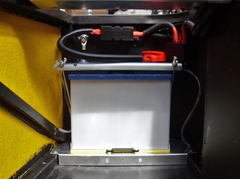 
Description
 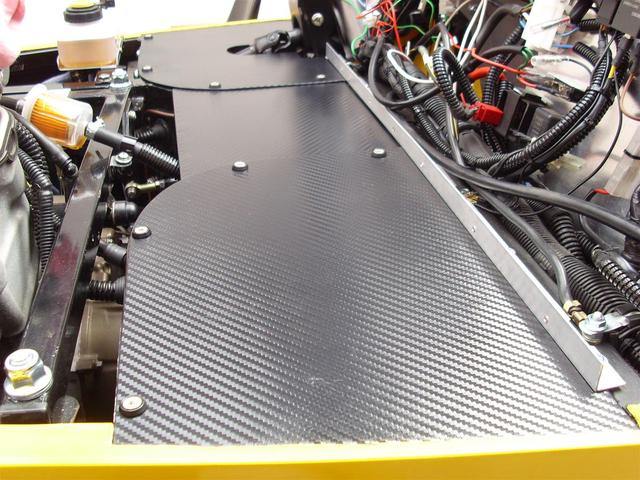
Description
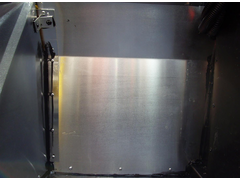 
Description
[Edited on 3-3-21 by 40inches]
[Edited on 4-3-21 by 40inches]
|
|
|
rusty nuts
|
| posted on 4/3/21 at 07:31 AM |

|
|
Some TVRs have the battery in the passengers footwell
|
|
|
HowardB
|
| posted on 4/3/21 at 08:19 AM |

|
|
spot the battery
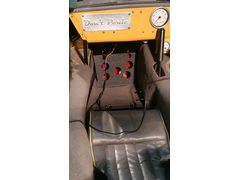 
New passenger footrest
Howard
Fisher Fury was 2000 Zetec - now a 1600 (it Lives again  and goes zoom) and goes zoom)
|
|
|
nick205
|
| posted on 4/3/21 at 10:47 AM |

|
|
My battery was in the engine bay above the passengers feet.
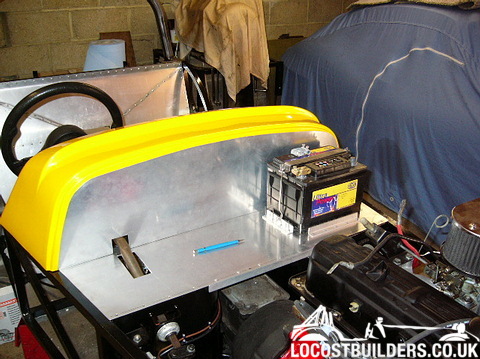
If it's going to be in the passenger footwell I'd want it to be panelled off from access via the footwell and maintain access from above
via the engine bay.
That said I don't know what the IVA rules are for this.
[Edited on 4/3/21 by nick205]
|
|
|
robertst
|
| posted on 4/3/21 at 11:56 AM |

|
|
quote:
Originally posted by HowardB
spot the battery
 
New passenger footrest
I did exactly the same thing as HowardB, put the battery in the passenger footwell and covered it with an ali panel fixed to the floor with bolts and
wingnuts. Passed IVA with flying colours. The panel is necessary to avoid the IVA sphere of doom, without which you will probably fail the
inspection.
Taken from section 12 of the manual:
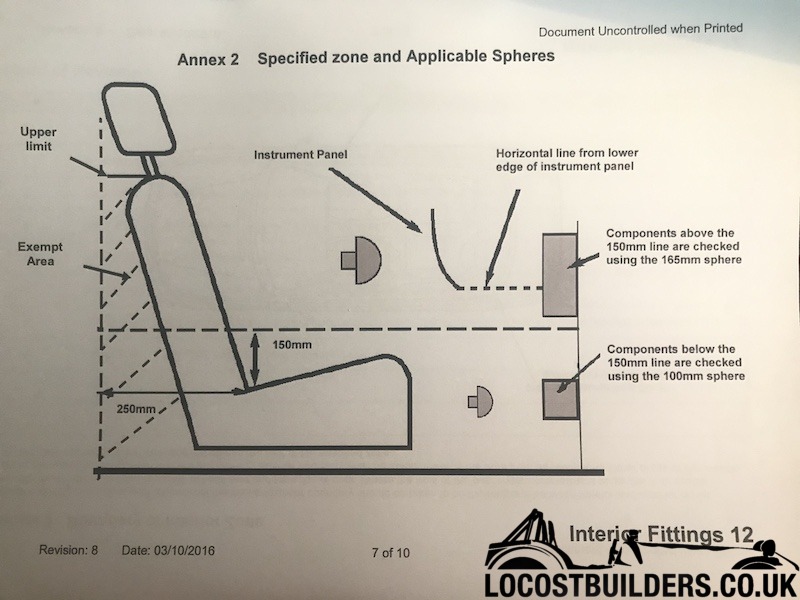
I have since relocated the battery back up to the engine bay shelf, as it was taking up too much space in the footwell, making it quite uncomfortable
for passengers.
[Edited on 4/3/21 by robertst]
Tom
|
|
|
coyoteboy
|
| posted on 4/3/21 at 01:14 PM |

|
|
IVE aside, I think I'd have a real fear of impact risks unless it was behind a proper solid footplate. Best practice would put anything with a
huge detachable mass or large quantity of corrosive liquid on the far side of a firewall.
|
|
|
coyoteboy
|
| posted on 4/3/21 at 01:14 PM |

|
|
IVA aside, I think I'd have a real fear of impact risks unless it was behind a proper solid footplate. Best practice would put anything with a
huge detachable mass or large quantity of corrosive liquid on the far side of a firewall.
[Edited on 4/3/21 by coyoteboy]
|
|
|
40inches
|
| posted on 4/3/21 at 01:26 PM |

|
|
quote:
Originally posted by coyoteboy
IVA aside, I think I'd have a real fear of impact risks unless it was behind a proper solid footplate. Best practice would put anything with a
huge detachable mass or large quantity of corrosive liquid on the far side of a firewall.
[Edited on 4/3/21 by coyoteboy]
That is why mine is behind a completely sealed panel
There is still enough leg room, the same as the drivers side.
|
|
|
David Jenkins
|
| posted on 4/3/21 at 01:58 PM |

|
|
I must admit that if was unfortunate enough to have a serious crash I really wouldn't want a lead-acid battery in the passenger compartment,
right in front of me or my passenger. There would be enough to worry about, without dilute sulphuric acid dripping around...
But each to their own...
[Edited on 4/3/21 by David Jenkins]
|
|
|
nick205
|
| posted on 4/3/21 at 02:30 PM |

|
|
At the OP - if your aim is getting the mass of the battery closer to the ground can you not relocate it lower in the engine bay?
IIRC BMW (and possibly others) put their batteries in the boots of their vehicles? I'd imagine that takes some good knowledge and understanding
of vehicle electrics and cable sizes though.
|
|
|
steve m
|
| posted on 4/3/21 at 06:16 PM |

|
|
quote:
Originally posted by nick205
At the OP - if your aim is getting the mass of the battery closer to the ground can you not relocate it lower in the engine bay?
IIRC BMW (and possibly others) put their batteries in the boots of their vehicles? I'd imagine that takes some good knowledge and understanding
of vehicle electrics and cable sizes though.
Nicley placed next door to the fuel tank, I DONT THINK SO !!
Erroneous spark, and BOOOOOOM
And what if you get rear ended ?
Thats was probably spelt wrong, or had some grammer, that the "grammer police have to have a moan at
  
|
|
|
nick205
|
| posted on 4/3/21 at 07:18 PM |

|
|
quote:
Originally posted by steve m
quote:
Originally posted by nick205
At the OP - if your aim is getting the mass of the battery closer to the ground can you not relocate it lower in the engine bay?
IIRC BMW (and possibly others) put their batteries in the boots of their vehicles? I'd imagine that takes some good knowledge and understanding
of vehicle electrics and cable sizes though.
Nicley placed next door to the fuel tank, I DONT THINK SO !!
Erroneous spark, and BOOOOOOM
And what if you get rear ended ?
Sorry - I wasn't suggesting the OP put his battery in the boot of his car, just commenting that some tin top manufacturer's do (weight
distribution I believe).
|
|
|
snapper
|
| posted on 4/3/21 at 10:37 PM |

|
|
If you put a battery in the footwell then you are effectively shortening the footwell so why not shorten the footwell and keep battery in the engine
bay, much safer as you really do need a bulkhead between dangerous stuff and people. A hell battery may be safer but I would still seal it from the
passenger cell.
I have a lead acid battery in the engine bay just in front of the footwell under the bike carbs, I have secured it well and covered it with rubber,
there are battery boxes that will seal it but be aware that explosive gasses need to be vented safely
I eat to survive
I drink to forget
I breath to pi55 my ex wife off (and now my ex partner)
|
|
|
40inches
|
| posted on 5/3/21 at 12:05 AM |

|
|
quote:
Originally posted by snapper
If you put a battery in the footwell then you are effectively shortening the footwell so why not shorten the footwell and keep battery in the engine
bay, much safer as you really do need a bulkhead between dangerous stuff and people. A hell battery may be safer but I would still seal it from the
passenger cell.
That's exactly what I have done, effectively moved the bulkhead back and sealed it, both the original bulkhead and the new one are 1.5mm ally,
the battery vents into the engine bay, as does the battery compartment.
The battery is behind this panel, sealed all round.
 
Description
|
|
|
jps
|
| posted on 5/3/21 at 11:09 AM |

|
|
quote:
Originally posted by steve m
quote:
Originally posted by nick205
At the OP - if your aim is getting the mass of the battery closer to the ground can you not relocate it lower in the engine bay?
IIRC BMW (and possibly others) put their batteries in the boots of their vehicles? I'd imagine that takes some good knowledge and understanding
of vehicle electrics and cable sizes though.
Nicley placed next door to the fuel tank, I DONT THINK SO !!
Erroneous spark, and BOOOOOOM
And what if you get rear ended ?
The original Mini also had the battery in the boot, along with the fuel tank - can't say i've heard of lots of them exploding?
|
|
|
coyoteboy
|
| posted on 5/3/21 at 02:56 PM |

|
|
Lots of cars have them in the boot. MX5 for example.
Ultimately it's very little different to anything else, you only need a TINY spark to ignite petrol and your car is LACED with positive wires.
This is why I chuckle at the people who worry about EVs and their potential for damage - it's nothing compared to the highly volatile,
concentrated explosive thin-walled tank 'o' dinosaurs in the boot of an average car.
[Edited on 5/3/21 by coyoteboy]
|
|
|
Mash
|
| posted on 5/3/21 at 09:43 PM |

|
|
quote:
Originally posted by coyoteboy
Lots of cars have them in the boot. MX5 for example.
Ultimately it's very little different to anything else, you only need a TINY spark to ignite petrol and your car is LACED with positive wires.
This is why I chuckle at the people who worry about EVs and their potential for damage - it's nothing compared to the highly volatile,
concentrated explosive thin-walled tank 'o' dinosaurs in the boot of an average car.
[Edited on 5/3/21 by coyoteboy]
Fair point, but in all the RTCs i have attended as a firefighter and we get quite a few, I've never come across a car that has exploded.
Our worry is the danger of a 400 v cable being severed in an accident and the damage it could do to us and any trapped persons in the vehicle.
I thought I could see light at the end of the tunnel, but it was just someone with a torch bringing me more stuff to do
|
|
|
David Jenkins
|
| posted on 6/3/21 at 08:57 AM |

|
|
quote:
Originally posted by Mash
Our worry is the danger of a 400 v cable being severed in an accident and the damage it could do to us and any trapped persons in the vehicle.
Totally off-topic, and purely out of interest, do firefighters get any instructions on how to deactivate an electric car? My Kia e-Niro has a loop of
cable at the very front of the engine compartment with all sorts of labels around it - basically, they tell the firefighter to cut or unplug this
little cable (signal voltage only) which will make the whole battery pack shut down.
|
|
|
coyoteboy
|
| posted on 6/3/21 at 12:22 PM |

|
|
quote:
Our worry is the danger of a 400 v cable being severed in an accident and the damage it could do to us and any trapped persons in the vehicle.
Indeed, despite carrying a fluid incendiary device, the probabilities are low. And with electric...
Put it this way :
In general they're buried deep within the structure and protected. If they're damaged you're likely to be recovering jam. However...
If it is severed, it was severed by contact with the sharp exposed structure. This should trip the pack overcurrent protection and remove the 400V
cable risk.
Though I'll give you the fact that there are certain weird circumstances where you may break the pack in half and end up with exposed terminals
that evade the pack level protection. 200v DC wouldn't be fun to work around, but you're balancing probabilities on probabilities to get
to that risk being realised. The risk that you break the pack, expose the terminals, come into contact with it and all that time it didn't come
into contact with the chassis and pop the sub pack protection or just dissipate the energy internally (and potentially venting) is quite low. Add to
that that EVs have to have inertial cutoffs and are now getting pyrofuses to permanently sever high voltage connections, it's only getting
safer.
My point, I guess, is the risks are present, but in both cases pretty unlikely. I wonder if we can find a paper on any of the thought process that
went into them, as I'm 100% sure this has been considered, if not communicated.
[Edited on 6/3/21 by coyoteboy]
|
|
|
David Jenkins
|
| posted on 6/3/21 at 01:05 PM |

|
|
There is a picture somewhere in the wild wild web of a Jaguar i-Pace that had had an accident, possibly in London. The car ended up on its 2 left
wheels, with most of its weight resting on top of a bollard. The bollard was against the middle of the right-hand side of the battery case, so almost
of the car's considerable weight (in excess of 2 tonnes) was resting on that one point - there was hardly a dent in the case floor.
They put the batteries in strong boxes!
|
|
|













